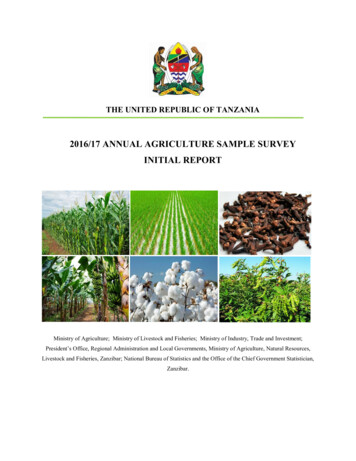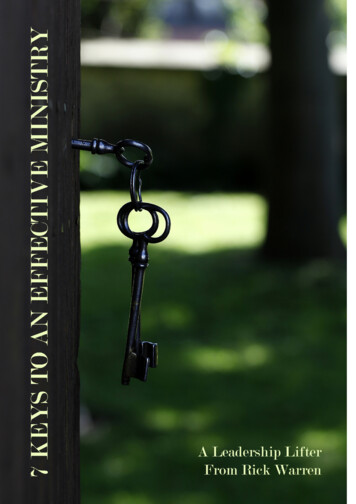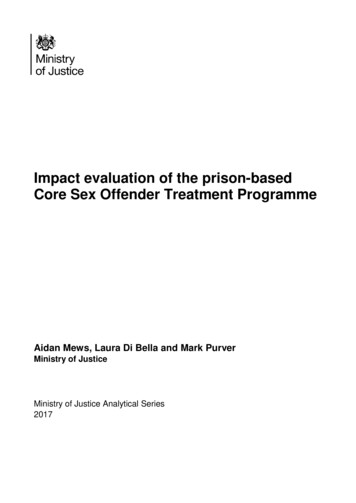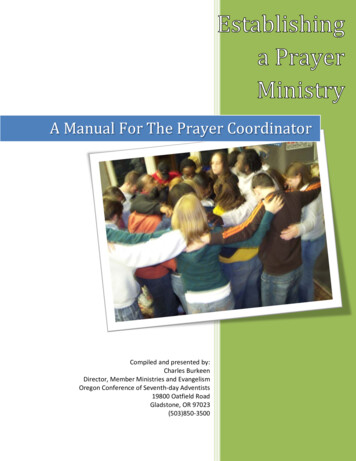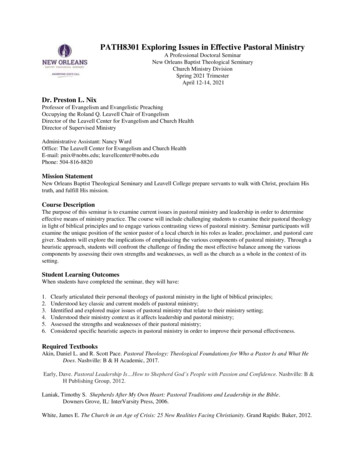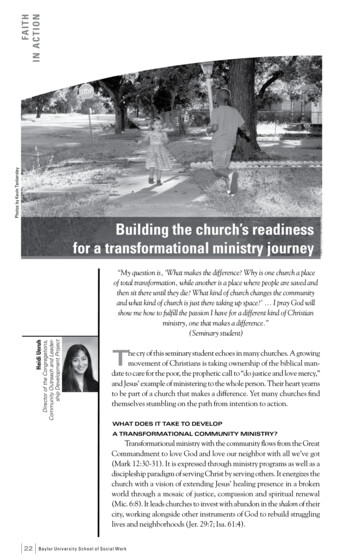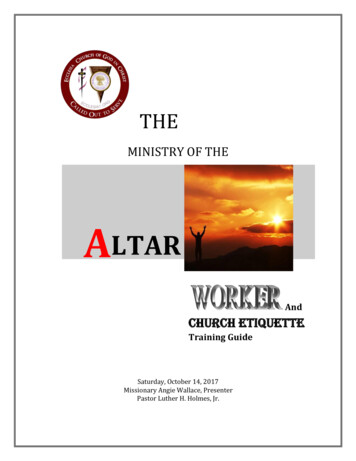
Transcription
THEMINISTRY OF THEALTARAndchurch etiquetteTraining GuideSaturday, October 14, 2017Missionary Angie Wallace, PresenterPastor Luther H. Holmes, Jr.
The Ministry of the Altar WorkerTRAINING PURPOSEThe purpose of the Altar Workers’ Ministry Training is to introduce the Elders, Ministers,Missionaries and Deacons to the basics of ministering at the altar. We will also review someof the do’s and don’ts as is connected to the culture of Ecclesia. We have felt the pains ofdisappointment as hungry souls responded to the invitation to receive God's provisions,only to find that sometimes no one was able to effectively assist them at the altar.Another reason why we are having this training is to make sure we have consistency in howwe do ministry and set standards of excellence in everything that we do. Daniel 6:3 states,“then this Daniel was preferred above the presidents and princes, because an excellent spiritwas in him, and the king thought to set him over the whole realm.” There are different giftsand anointing but there must always be a level of consistency in the house in terms of howwe operate and equip those who are serving in this capacity to do ministry in an effectiveway. Abiding in covenant with this training maintains the excellence required to doministry in this season. The joy and rewards from this ministry is seeing people free, savedand walking in the power of our God!OBJECTIVETo instruct, assist and/or lead the seeker to an experience with God and assist leadership insustaining order in the house during times of altar calls.THE MISSIONTo demonstrate a passion for souls by ministering to and ensuring that those who respondto the altar call receive salvation, restoration or special prayer by offering words ofencouragement and maintain order during altar calls.SCRIPTUREJames 5:16 King James Version (KJV)16Confess your faults one to another, and pray one for another, that ye may be healed. Theeffectual fervent prayer of a righteous man availeth much.2
THE ALTARThe Altar as introduced to us in the Old Testament under the Mosaic Law provided that thepriests and Levites alone could labor in altar duties. Altars were used primarily as places ofsacrifices, especially animal sacrifice. Altar literally translates place of self-sacrifice, totalsurrender to God, place of emptying-out; a place of death. New Testament references toaltars concern proper worship (Matt. 5:23-24) and hypocrisy in worship (Matt. 23:18-20).The message that Jesus Christ is the ultimate sacrifice who puts us right with God is thetheme of the New Testament. In our church (Ecclesia), the altar is a place people can comeand repent of their sins, pray to receive the baptism of the Holy Ghost, pray for needs, prayfor deliverance, and to get a "touch" from God.THE ALTAR CALLWhile Altar Calls as practiced today are not found in the Bible, there are however, severalbiblical examples to support using them. First, Christ called each of His disciples publicly,telling them “follow Me” (Matthew 4:19, 9:9) and expecting them to respond immediately,which they did. Jesus was demanding an outward identification with Himself on the part ofthose who would be His disciples. Proponents of the altar call also cite Matthew 10:32 asproof that a new believer must acknowledge Christ “before men” in order for Him toreciprocate.So, the Altar Call or Call to Discipleship is the practice of inviting people forward after anevangelistic sermon to make a public confession of faith in Christ. It is so named becausethe supplicant (a person who asks for something in a respectful way from God) gather atthe altar located at the front of the church building. During this time the supplicant makes aprayer asking for his sins to be forgiven, acknowledges Jesus as the risen Son of God andpledges his/her devotion to Jesus and to live thereafter following Christ's teachings. This iscalled being born again. Romans 10:9 makes it clear that genuine salvation comes only fromheartfelt belief, which will then result in a verbal confession of that faith. We believe theAltar Call is the Crowning Glory of the Church Service.The Altar Call is also an appeal to saints to come forward for specific purposes. Forexample, to rededicate their lives, to pray for healing, to surrender a new part of their livesto God, or to receive a blessing. It is also a place of dedication where callings are given (suchas a call to the ministry). The Altar Call often involve the laying on of hands, and manypeople will come for prayer to receive their need. The Scripture teaches us that Jesus hasgiven us power to lay hands on the sick and they shall recover throughout the Bible - Oldand New; it teaches us about the laying on of hands by the priest (Mark 5:23; Mark 16:18;Acts 8:19; Acts 28:8). To lay hands is impartation of faith, power, healing and deliverance.The laying on of hands is a point of contact that (1) allows the person receiving ministry tofeel the power and, (2) it allows the person praying to feel the need of that person (revealedby the Holy Ghost). Remember, the yoke is destroyed because of the anointing.3
TYPES OF ALTAR CALLSThe majority of altar calls usually concern:Salvation:A call for those who need to repent from theirsins and be born-again.Baptism of the Holy Spirit:A call for those who want to receive the baptismof the Holy Spirit.Commitment:General calls for those who want to recommittheir lives, desire a deeper walk with the LordJesus Christ, etc.Healing:An appeal for those who need physical, mental,or emotional healing.Deliverance:An appeal for those needing deliverance fromaddictive substances, from depression, fear,anger, bitterness, other works of the flesh,demonic influences, etc.LINE ALTAR CALLSWhenever there is a line call for prayer, the Altar Worker’s responsibility is to make sure theline flows and that everyone receives prayer and proper coverage is provided. Keep theawaiting congregation praying with lifted hands as a long as you can. This is not a cheeseline where you are waiting to get your portion. God can move in the line without handsbeing laid on. Keep the praise going and the anticipation thriving so that the ministry willbe easy for the one ministering.CORPORATE ALTAR CALLSDuring times of corporate altar calls, the altar workers should surround the altar to beavailable as needed. Be mindful of your surroundings and the proper protocol for theminister. There may be times when you may be asked to anoint before prayer at the altar.You just anoint them in the name of Jesus and move on to the next person. If you are told tomove forward and minister, when possible, do so two-by-two; one praying the othercovering. Please allow God to use the one He desires. What I mean is that if the anointing isflowing on your partner to pray then continue to cover and let them pray. Be a team player;this is not the time for you to show off how anointed you are or to score some points withthe leader. The altar is about souls, pleasing God, and allowing the anointing to work.THE MINISTRY OF THE ALTAR WORKERAltar Workers must have a full understanding of the roles and responsibilities for thisministry. They have the privilege of interceding and engaging in a spiritual battle for the4
souls of God's people. When a person comes to the altar in faith they will walk awaychanged by the Power of the Holy Ghost. The Altar Worker must live a life acceptable to the Lord.The Altar Worker must be saved and filled with the Holy Ghost.The Altar Worker must be confident in operating in the authority of God and reallyfeel the call to the ministry of prayer.The Altar Worker must have a life of prayer and intercession.The Altar Worker must be a faithful and committed tithe paying member.The Altar Worker must be one who is sensitive to the leading of the Holy Ghost.The Altar Worker must be one who has the spirit of submission and followsleadership.The Altar Worker must be one who understands and knows the principles ofsalvation.The Altar Worker must have a keen eye and relationship with the Lord as well aswith the Pastor.The Altar Worker must know the Pastor’s heart and style of ministry. You must beattentive and know the gestures and sign languages he sometimes uses.The Altar Worker must be confident in his/her gifting to intercede for individualsand lead individuals to Christ and His Kingdom. They basically operate as theextended arm to individuals that respond to God’s work at the altar to ensure that wecan navigate their entrance into the kingdom.ALTAR MINISTRY PREPARATIONTo ensure that proper etiquette and hygiene are preserved during the altar call experience,all altar workers will practice the following:1. Refresh hands discreetly with hand sanitizer to ensure we have clean hands.2. Be careful about personal hygiene (teeth, breath and body odor). Carry a supply ofbreath mints or breath strips and use them as you see the minister concluding hismessage.3. Be mindful of strong perfumes and colognes.THE ALTAR WORKER’S ROLESince the work of the altar worker greatly determines the destiny of the candidate, he, forChrist's sake, the Church's sake, the petitioner's sake, and his own sake cannot take thisministry lightly. It cannot be a hit or miss situation. It is judgment work. The Scripturesdeclares, "He that winneth souls is wise" (Proverbs 11:30). You have the opportunity to"reap" spiritual fruit for the Kingdom of God. As a minister shares God's Word, he or she is“sowing” it in the hearts of those who listen. After the sermon when he or she providesopportunity for listeners to respond to their challenge, a great spiritual "harvest" is ready tobe reaped. As an altar worker, you serve those who respond to the altar call made by the5
minister. You are working with the minister to "reap" the spiritual fruit of men, women,boys, and girls who have received and acted upon the Word of God.The altar worker’s approach should always be positive. The gospel is a positive message. Itbrings people from darkness to light, from sin to salvation, from death to life. Therefore,you cannot afford to be anything but positive. You must be convinced that what you have tosay will, through Christ, change the person's life as he follows your instructions. You cannothave any doubts or reservations as to whether the salvation you are advocating throughChrist is what the person needs. You also must believe and doubt not that he is going toreceive his need while you pray with him. The Word declares it, you believe it, and thework is done! Jesus said, "Therefore I say unto you, what things so ever ye desire, when yepray, believe that ye receive them, and ye shall have them" (Mark 11:24).When a person responds to the invitation of the preacher to come forward and acceptChrist or receive a deeper experience from the Lord, he is normally very sincere. He isdoing what the preacher has suggested. Therefore, it is only reasonable that there shouldbe someone to meet him at the altar and explain further how to receive these blessingsfrom the Lord. The altar worker has this privilege. He is the specialist in this area ofministry. The more he studies, prays and applies himself to this ministry, the moreproficient he becomes.The altar worker must learn a system or plan in which he proceeds from point "A" to point"B" to point "C", etc. It is much like the builder who builds the house. He simply follows theblueprint and the work is accomplished. Likewise, the altar worker simply follows the plan. When the altar call is made, be ready to move forward immediately. The Elders,Ministers and Missionaries will move to the front of the altar and face thecongregation with extended hands receiving persons who are coming to the altarand awaits instructions from the minister.If the presiding minister decides to pray for those on the altar then all other altarworkers will agree with the general prayer.If the minister directs the altar workers to pray for the individuals at the altar thenask the Holy Ghost to lead you to the person to whom you should minister in yourimmediate area.Assisting other visiting ministers at the altar requires interaction with people duringprayer, salvation, deliverance and healing. The altar worker is required to do a lot ofbending and moving around. For this cause, clothing should be loose fitting allowingyou room to move around. Always keep up with the one ministering as they maymove all around the sanctuary. Keep up with the flow.If the altar is full then as many elders, ministers and missionaries should availthemselves to assist if it is only to agree with the altar worker that will pray with theseeker.6
Make sure the seeker is not confused by the altar workers. If an altar worker hasprayed for the seeker than there is no need for another to pray an additional prayer.God is not the author of confusion.There may be times when you see a need but because of the setting you will not beable to minister freely. This is when intercession covers that individual and God willbless through prayer and we trust that at the appropriate time God will allow thatperson to be in a setting where they can be properly ministered to.HOW DO I CATCH A PERSON?I know it has been said “Well, if they are in the spirit they won’t get hurt” but in the times inwhich we live churches have been sued because of this. Be watchful to prevent those whomay become overwhelmed in the spirit and fall on someone causing a domino effect.First and foremost, you should always handle someone gently. Remember to protect yourback by bending your knees as you lower them to the floor. If you are ministering alone andsomeone heavier than you are receiving ministry, brace your body against that person andplace one leg behind and prop them. This will keep you from falling. The appropriate way tocatch a full-figured person is to have two (2) altar workers stand directly behind them asclose as they can with their hands clamp around the wrist. Try not to hold hands; this is notsecure as sometimes the hands will easily come loose with the pressure of weight. Byholding onto the wrist, you have more strength. Attempts to keep them standing issometimes possible by pressing our body against them but if not possible gently lower themto the floor bending your knees to protect your back. Always make sure you refrain fromtouching people inappropriately. Appropriate position for catching will be demonstrated for you. Because of the times we are living in women and men wear a lot of weaves, wigsand extensions. Be mindful not to pull or tug on them. To prevent embarrassmentensure they are intact before they return to their seats (fix clothing, hair, wipe face,give back glasses, jewelry, etc.). Always be mindful to assist the person getting upfrom the floor.THE DO’S & DON’TS OF ALTAR WORK Be aware of what you are praying (ask the individual if you do not know), otherwiseprayers may be prayed in vain and time wasted. Be unctioned by the Holy Ghost. Be careful not to be offensive in any manner and avoid unnecessary screaming in theseeker’s ear or slapping them on the back or massaging them as this may have adisconcerting effect. Don’t yell in their ears. Altar services can get very loud. Getclose to the seeker’s ear and ask in a low voice “Can you hear me?” If they arehaving trouble hearing you, you can turn up the volume a little at a time until theydo hear your instructions clearly. Do not call out personal problems loudly. Believe that God will bring deliverance .do not doubt or waiver. Don’t get so happy that you forget that you are ministering to someone and notbeing ministered to. Stay focused. You are not there to get a blessing yourself (and7
in doing so forget about helping the seeker). Rebuke the devil in your mind, staywith one accord with the seeker. If a person is crying or responding emotionally to an appeal, do not interrupt thisprocess unless it becomes "out of order" (extremely loud, disruptive, attentiongetting). Just draw alongside and begin to pray for them quietly. We are emotionalbeings, and God often deals with us first at the emotional level. When the emotionsubsides, then you can talk with the seeker. It is important to follow up with ministry even when strong emotions have beenevident. For example-- crying because one is sorry for sin is not enough. The seekermust understand the plan of salvation and make the proper response of repentanceafter the "godly sorrow" has subsided. Don’t work the altar with bad breath or body odor. Don’t spit in their face when you are praying with the seeker. Don’t mess up their hair or clothing. Though many try, we cannot shake the HolyGhost into a person. Don’t put words in their mouth to get them to speak in tongues. Never tell a seekerto repeat after you, or to say something (i.e. “la-la-la”, etc. ). Don’t get in their face (people today are very conscious of infectious diseases). Get consent from the seeker before you lay hands on them. Be sensitive, inoffensive, empathic (feel what they feel) Be perceptive. Observe what they are saying and what they are doing. Look for bothpositive and negative signs. Men should pray for men, and women pray for women. Exceptions would be in caseswhere the person responding is a relative (i.e., you are a woman and your brotherresponds to the salvation call) or when a husband and wife minister together to anindividual of either sex. Men can lay hands on the head, shoulder, back or arms of another man. Men shouldlay hands ONLY on the head of a woman seeker. Women can lay hands on the head, shoulder, back or arms of another woman.Women should lay hands ONLY on the head of a man seeker. You should never lay hands on the Leader of the House without his/her permission. Serious problems should be referred to the pastoral staff. For example--if youminister to someone who is suicidal, a young lady planning an abortion, or someonewhose home is about to break up--such situations are examples of serious problemsthat should be referred to the pastor. If you encounter a problem in ministering atthe altar and you do not know what to do, ask for assistance from a member of thepastoral staff in your immediate area.8
DISTRACTIONSDistractions are things that bring attention to someone or something other than the Word ofGod. It’s important that we are never a part of distractions. Here’s a brief list of some thingsthat can bring distraction: Talking or whispering to other workers Chewing Gum Pulling and/or tugging on the individual Laughing and joking at the altar Fanning the person while they are still in the Spirit Laying hands too heavily on the person Pouring too much oil (running into eyes, face, clothing) Pulling from the floor before they are ready Please handle carefully the loved ones of the one getting prayer. Sometimes thechildren or others don’t understand what’s happening and become fearful. They tryto pull and tug on them to make sure they are okay. If possible, remove thembeforehand. Noise, it is so important to have a praying church while the altar call is going on.9
ADDITIONAL GUIDELINES FOR MINISTERING10
HERE ARE GUIDELINES FOR MINISTERING TO THOSE IN NEED OFSALVATION. HOW TO LEAD TO CHRIST:The Bible teaches that salvation (being born again) is necessary for a person to see theKingdom of God, to receive eternal life, forgiveness of sins, to receive the baptism of theHoly Ghost, and to become a child of God and joint-heirs with Christ. Salvation is receivedby faith in the death and resurrection of Jesus Christ for the atonement of sin and includes aturning from sin (repentance). Salvation is by God's grace through faith. Once the AltarWorker has learned that the supplicant you are dealing with needs salvation, you are readyto begin leading him into a new life in Christ. You need not be timid or backward aboutdirecting him toward a decision. The path you are taking him means the difference in hiseternal destiny. You are leading him from the fires of hell to the glories of heaven. If theperson indicates his need of conversion, the altar worker will need to determine theknowledge of the candidate concerning salvation. If he has little knowledge of being bornagain, he will of necessity be approached differently than if he is a backslider. The altarworker may ascertain that he is interested in returning to Christ or he would not have comeforward. Therefore, the altar worker should influence him to make a commitment bysaying, "You desire to again enjoy fellowship with Christ, don't you?" His answer willnormally be positive. Assure him that Jesus desires to take him back into His fellowship.Explain that he must return the same way in which he first came to Christ to further solidifythe fact that Christ will accept him, have him read in your Bible 1 John 2: 1, 2. "My littlechildren, these things write I unto you, that ye sin not. And if any man sin, we have anadvocate with the Father, Jesus Christ the righteous: And he is the propitiation for our sins:and not for ours only, but also for the sins of the whole world." (You should have thismarked in your Bible and know it from memory.) Explain to the person what the word"advocate" means. (An advocate may be defined as a person who pleads for another'scause.) Also, explain to him that propitiation means that the blood-sprinkled body of Christon the cross became the sacrifice for sinners once and for all.SHARE THE NEED FOR SALVATION:Using the Scriptures, explain that they need salvation because all have sinned.SHARE GOD’S SOLUTION:Using the Scriptures, share God's solution for sin, salvation by grace through faith.11
BRING TO A POINT OF DECISION:Bring the seeker to a point of decision, a positive affirmation that he wants to be saved.PRAY WITH THE PERSON:Pray out loud together. Have the person confess His sins and receive Jesus Christ as Savior.If help to pray is needed, ask him to follow you in a prayer such as:Jesus, I acknowledge that I have sinned. Please forgive me of my sin as I now repent. I take youat your Word that you forgive those who ask. I accept you as my Savior. Thank you forcleansing me from sin. In Jesus name, Amen.Before leaving the altar, you should confirm the acceptance of the individual who give theirlife to Christ or decision to connect and fellowship with Ecclesia.SCRIPTURES FOR MEMORY:1) Acknowledge the Lost Condition:Romans 3:23Isaiah 53:62) Believe the GospelActs 16:30John 3:363) Repentance of SinsLuke 13:3Isaiah 55:74) Receive Christ as Personal SaviorJohn 1:12John 3:16Revelation 3:205) Confess Him as LordRomans 10:9,10Mark 8:3712
Ministering to Those Who Respond to Receive the Baptism of the HolySpiritThe baptism of the Holy Spirit is the overflowing of the Holy Spirit into, upon, and out of aborn-again believer. It is the fulfillment of the promise of the Father to all believers. It leadsto a full, purposeful, and victorious life in Jesus Christ. Speaking in an unlearned language isfor one's own spiritual edification (1 Corinthians 14:2, 4); to extol the works of God (Acts2:11); and to present a message from God (1Corinthians 12:10; 14:6). It is a sign of theindwelling of the Holy Spirit. Power for service is the confirming evidence. Salvation is thequalification to receive the baptism with the Holy Spirit.MINISTERING TO THOSE NEEDING THE BAPTISM OF THE HOLY SPIRITHere are guidelines for receiving the baptism of the Holy Spirit. Encourage the seeker to:REPENT AND BE BAPTIZED:Then Peter said unto them, Repent, and be baptized every one of you in the name ofJesus Christ for the remission of sins, and ye shall receive the gift of the Holy Ghost. (Acts2:38)BELIEVE THE EXPERIENCE IS FOR THEM:For the promise is unto you, and to your children, and to all that are afar off, evenas many as the Lord our God shall call. (Acts 2:39) ACCEPT IT AS A GIFT:The Holy Spirit has already been given. It was given to the Church on the Day ofPentecost. Because it is a gift, you can do nothing to earn it: the gift of the Holy Ghost. (Acts2:38) This only would I learn of you. Received ye the Spirit by the works of the law, or by thehearing of faith? He therefore that ministereth to you in the Spirit, and worketh miraclesamong you, doeth he it by the works of the law, or by the hearing of faith? That the blessingof Abraham might come on the Gentiles; through Jesus Christ; that we might receive thepromise of the Spirit through faith. (Galatians 3:2, 5, 14)PRAISE AND WORSHIP GOD:Join the seeker in praise and worship of the Lord and wait for the evidence to come forth.Expect it to do so! The evidence may come at first with "stammering lips.” A fluency inlanguage comes with usage. The seeker should offer any sound not understood byhimself as praise to God. For with stammering lips and another tongue will he speak to thispeople. (Isaiah 28:11)13
If, after a period of time, the evidence of a Spirit given language is not forthcoming,encourage the seeker to continue seeking the Lord through praise and worship.Assure him that the experience will come as he continues to praise God in his prayer timeand learns to yield to the Spirit.Ministering to Those Who Respond for CommitmentAltar calls for commitment are general calls made for those who want to recommit theirlives to Jesus or desire a deeper walk with the Lord Jesus Christ. Such calls may also focuson dedicating to full-time Christian service, responding to mission appeals, rededicatingto your marriage and family, etc.MINISTERING TO A PERSON RESPONDING FOR COMMITMENTHere are guidelines for ministering to a person responding for commitment:DETERMINE THE REASON FOR THEIR RESPONSE:Ask the seeker, "What may I pray with you about?" This will determine the reason he hasresponded to the call.PRAY SPECIFICALLY ABOUT THE NEED:Pray specifically for his desire, i.e., a deeper walk with the Lord, guidance for full-timeChristian service, recommitting his life to the Lord and His service, etc. understood byhimself as praise to God.Ministering to Those Who Respond for HealingIn an altar call for healing, a minister usually requests those in need of physical, mental, oremotional healing to respond in some manner. The Bible promises physical healing, butwe should never focus on physical healing apart from the more important matter ofspiritual healing. The Bible does teach divine healing is available through the atonementand that God heals physically, mentally, and emotionally as well as spiritually.MINISTERING TO THOSE IN NEED OF HEALINGHere are guidelines for ministering to those in need of healing:LISTEN FOR INSTRUCTIONS:Calls for divine healing take various forms:The minister may ask people to lift their hands if they need healing and ask the altarworkers to go to them where they are and pray. He may ask those needing healing to stepinto the aisles and ask you to minister to them there. The minister may ask those in need ofhealing to come forward and line up or kneel at the altar and then ask you to come and prayfor them. The minister may ask people to come to the altar and have you just stand withthem as he prays individually for them. Listen carefully to the instructions so you will beable to flow with the Holy Spirit.BRING THE SEEKER TO A POINT OF DECISION:14
Sometimes you will only be asked to pray or join the minister in a prayer for healing. Othertimes you will have opportunity to pray with the seeker. If you pray, bring the seeker to apoint of decision regarding their healing, just as you do regarding salvation. Rememberhow Jesus asked the lame man, "Wilt thou be made whole?" (John 5:6).BE SURE THE PERSON IS BORN AGAIN:Make sure the person is born-again. This is "spiritual healing" and is the most importanttype of healing.DETERMINE THE SPECIFIC CONDITION: Jesus asked people what they wanted, inquiredconcerning their faith, and dealt with negative forces of unbelief before ministering to them.Ask the person, "What is the problem?" Jesus asked a similar question to many who came tohim for healing. Verbalizing the request for prayer is important for the sick. Ask for aspecific statement. If a request is too general, you will not know what to pray for and theaffected person may not recognize healing when it comes. You need only brief facts: "I havecancer of the stomach." You do not need a complete medical history. Do not try to analyzethe information you are given. Your function is to pray, not provide advice. Some uniquecases may require privacy and more time for counseling. Refer these individuals to thepastoral staff. Ask the person who is to be prayed for, "Do you believe Jesus can heal?" Ifthey answer positively, then ask, "Do you believe Jesus will do it now?” If the answer is "no"to either of these questions, further instruction from God's Word is needed.PRAY THE HEALING PRAYER:When you pray the healing prayer, pray specifically for the condition. Remember that youdo not have to persuade God to heal by the length or loudness of your prayer. Just assalvation is already available, the same is true of healing. Just as salvation is based on thecondition of faith, so is healing. God wants to heal, just as He wants to save. Although thepower of God is sometimes present in a special way for healing (Luke 5:17), you can stillpray for healing without a special anointing because Jesus commanded you to do it just asHe told you to spread the Gospel.PRAISE GOD FOR THE ANSWER:Follow prayer with praise to God for healing. Remember that in the case of the ten lepers allwere healed but only the one who returned to praise was made whole. Praise God by faithand not by sight. You have done what God's Word said to do. Believe He has done what Hesaid He would do. Thank Him for it. Jesus thanked God for hearing His prayer beforeLazarus ever came out from the tomb.Ministering to Those Who Respond for DeliveranceThe need for deliverance is manifested by an inability to be free from mental, emotional,physical, or spiritual bondage associated with demonic ac
to the altar call receive salvation, restoration or special prayer by offering words of encouragement and maintain order during altar calls. SCRIPTURE James 5:16 King James Version (KJV) 16 Confess your faults one to another, and pray one for another, that ye may be healed. The effectual fervent

